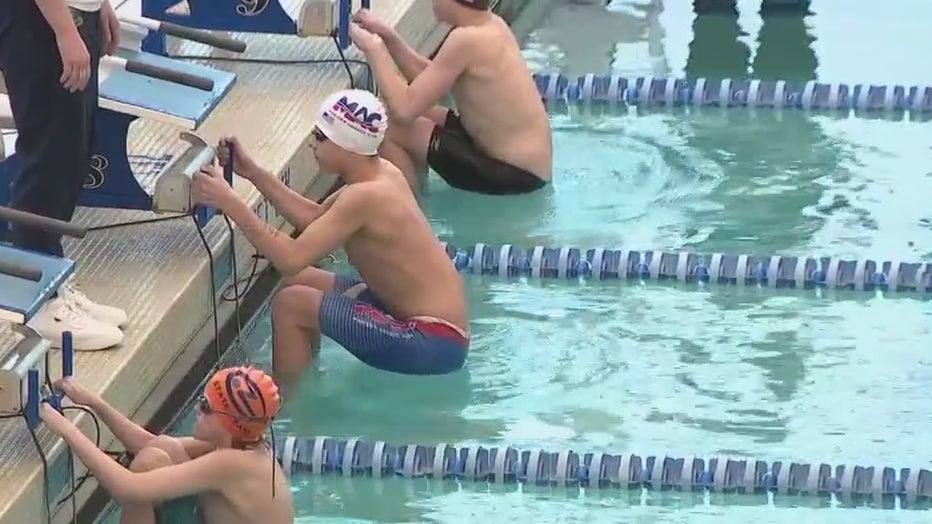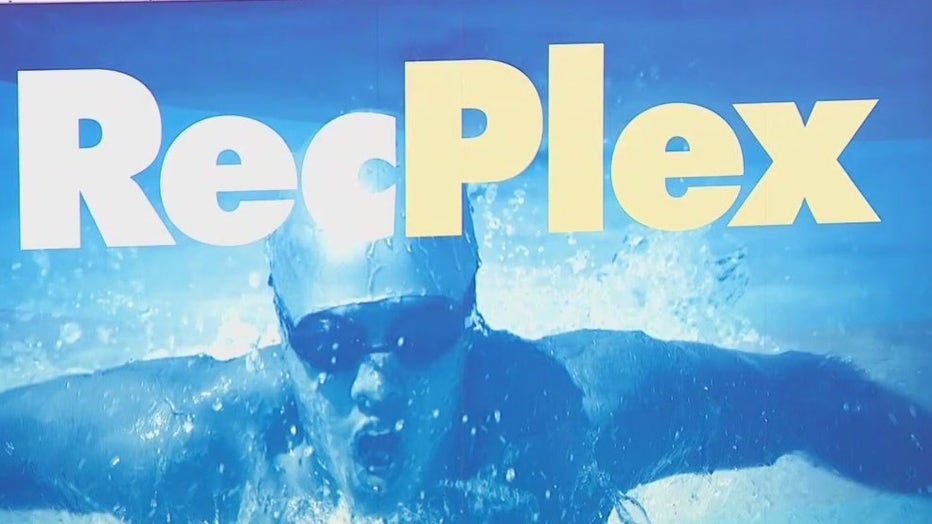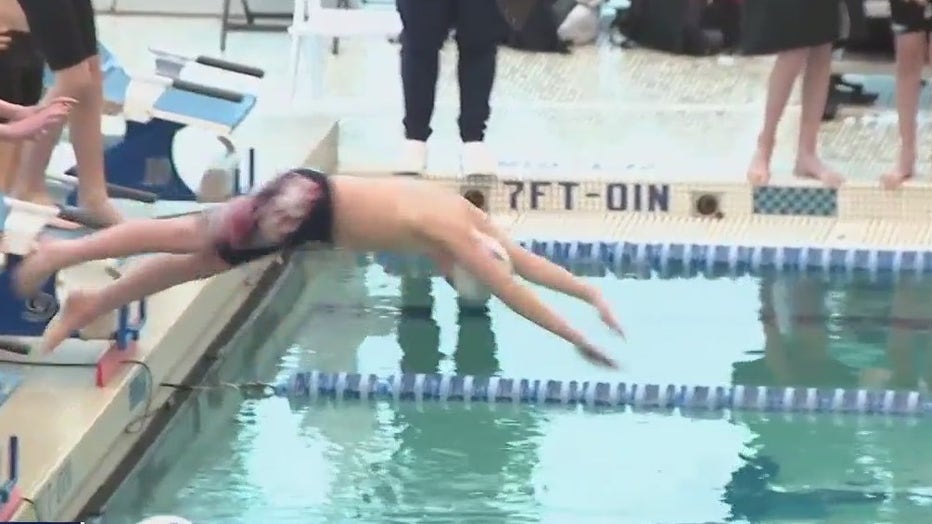Pleasant Prairie RecPlex swim meet health complaints

Pleasant Prairie RecPlex health complaints, what caused the sickness?
Why did so many swimmers and families get sick at a Wisconsin state championship? FOX6 looks at internal pool e-mails, swimming pool logs and talks to experts.
PLEASANT PRAIRIE, Wis. - Swimmers and parents attending a Wisconsin state championship have a lot of questions about why so many of them got sick. FOX6 reviewed internal e-mails, swimming pool logs and expert analysis to help answer that question.
FOX6 told you about their coughing, throwing up, itchy skin and red-eyes.
"You get out, and it’s just non-stop coughing," said Quincy Laufenberg.
"I couldn't really breathe that well," said Maya Adamson.
Since our first report, more swimmers, parents and spectators have shared similar stories, expressing disappointment after a year of training for the state championship.
"I couldn’t even swim the last day of the meet," said eighth-grade swimmer Abby Bowker. "I was so sick. I was up till 1 in the morning coughing, and I couldn’t get any sleep. It was awful conditions there."

Leaders of the Pleasant Prairie’s RecPlex, in a statement and letter to families, said they did find and fix a mechanical malfunction. The statement didn't explain what was malfunctioning.
In internal emails FOX6 acquired through an open records request, the center's recreation programming director, Brett Christopher, said, "We had some malfunctions with the HVAC units in Aqua, but the health department gave us the green light to move forward and considered everything safe."
In a follow-up e-mail with FOX6 News, Christopher explained the problem: "On Monday, March 6th, our Heating, Ventilation and Cooling contractor identified that two of our six Olympic pool exhaust fans that service the main pool area were in a failed state, resulting from an unknown electrical issue. While this failure was a contributing factor to the poor air quality, it was compounded by the large number of people on deck, the shortened downtime or ‘breaks’ between waves and the overall length of the event."
However, air quality worries at the venue were already discussed before the meet. In a Feb. 8 meeting of Wisconsin Swimming’s Coaches Advisory Council, coaches discussed changes to this very meet that were meant to spread swimmers out throughout the weekend.
The meeting minutes explained, "Timeline is not a concern. The number of bodies on deck for air quality is a concern."
Some thought maybe elevated chlorine levels were to blame, but that is not backed up by the lab work.
FOX6 reviewed the swimming pool logs for the Pleasant Prairie RecPlex. That included every day in February and March. Chlorine readings ranged from 2 to 4 parts per million. That's considered the ideal range, and well within the statutory limits of Wisconsin state law, which is 10 ppm.
In addition, on Monday, March 6, Carrico Aquatic Resources reported downloading data from the pool's chemical controller, which gathered numbers every two minutes all day March 3 through noon on March 6.
"During this time we did not see any anomalies that would indicate a dramatic change in ORP, chlorine, pH, temperature, or flow rate of the water itself," the document stated. "The highest chlorine reading happened in the afternoon of each day. At this time the chlorine in the water went from 2.0 ppm to 4.2 ppm. While reviewing this with the security camera footage these spikes happened at times when the pool was empty."
"That all sounds like reasonable pool chemistry," said Dave Anderson of a different pool, the Walter Schroeder Aquatic Center.
The RecPlex pool's PH, as found in those daily logs from February and March, including the days of the competition, showed either 7.4 or 7.5, which is considered the ideal range. One day, Feb. 7, the recorded number dipped outside that range with a PH of 7.3, according to the logs.

In the wake of the complaints about sickness at the state championship, the meet's organizer, Wisconsin Swimming, pointed to the size of the competition. In a statement, the group said the meet had 711 athletes, which the group said was well above the anticipated estimate.
Alana Anderson, a mother of a swimmer, said that should have been an easy fix, through more flexibility. She said when conditions got to be unsafe, the organizers should have acted, either by truncating the meet, or extending it out more, so there'd be fewer people in the facility at a time.
Anderson from the Schroeder center noted how numbers in the organization have surged in recent years. "The other thing that’s happened is increased size of competition, so when I first come to Wisconsin, I think Wisconsin Swimming had loosely 3,500 members. In 2017, we had about 7,000 members, so, it’s loosely doubled in size.",
Besides the size of the meet, Wisconsin Swimming's statement discussed pee in the pool: "Prior to the meet, Wisconsin Swimming did request the coaches to remind their athletes to NOT urinate in the pool and to rinse off as much as possible. This is a best practice the Wisconsin Swimming strongly advocates for all its athletes."
So, why discuss the size of the meet, as well as urine in the pool?
Joseph Clark, PhD, a Marquette University chemistry professor, said chlorine reacts with urea in urine to create irritants like trichloramine and dichloramine. In addition, these "disinfection by-products" can come when the chlorine reacts with dirt, sweat, or lotions. He said in higher concentrations, this can cause the problems kids and parents reported.
SIGN UP TODAY: Get daily headlines, breaking news emails from FOX6 News
"At specific concentrations, it’s going to start causing these respiratory and skin effects, and it’s actually considered a lacrimator, so we know of lacrimators because of things like pepper spray," Clark said. "This is causing people’s eyes to get watery, causing them to get red. It can really cause people’s asthma to sort of act up. I think it just has to do with the population density. If you have a lot of people jumping in and out of the pool, you have swimmers going all day long, they’re sweating, potentially urinating in the pool, you’re going to get a higher concentration of these by-products."

Swimmers said it is true some competitors do urinate in the pool. They point out some racing suits are very difficult to put on, and can take as long as 45 minutes to don.
"If they [Wisconsin Swimming] knew this was already a problem and this would be happening, they shouldn’t be blaming it completely on us. I think it’s more than just that that’s the problem," Bowker said.
Alana Adamson says the organizers need to apologize. She and her daughter Maya both felt sick at the meet.
"I think I was just mostly disappointed about the lack of any accountability. There was clearly reported symptoms, both the swimmers and the spectators were reporting anywhere from mild and serious conditions," Alana said. "And it seemed like Wisconsin Swimming and the RecPlex were kind of shrugging their shoulders, without even saying, ‘Sorry.'"
"I think as a parent of a swimmer that I saw struggling to breathe at times at her biggest meet of the year, this should have been a triumphant moment," said Adamson. "It felt really sad, and then to have it blamed back on the swimmers just felt disappointing and not very responsible on the part of Wisconsin Swimming."
Professor Clark says one way to prevent the problem in the future would be real-time monitoring of the trichloromine levels, similar to the real-time monitoring of chlorine levels.
According to the Carrico review, there are things the chemical controller misses. "There is not a reading this controller would provide that would show potential off-gassing in the room, or from the pool deck."
Another way to prevent the problem in the future, Clark says, is to improve ventilation. "I think just exchange, getting air from the outside in and taking that air inside and getting it out."
But Anderson adds that can be tough for pools. "There are systems that can be purchased that really do a great job of sucking the air right off the pool level and exhaust it outside," Anderson adds. "Those are really expensive."
Anderson adds that this isn't the first time people have gotten sick at a swimming meet.
"We have traveled across the country to indoor facilities, and this has been a relatively common problem in the last 20 years."
Many of these competitors look to a better, healthier race next year.
"I hope that next year and in years going forward that this is never an issue again," Bowker said." The one thing that a swimmer should not be worried about at a meet at this level is if they’re able to breathe or not or if they’re going to get sick and throw up."
Even though Bowker had to miss the final day of the state championship due to getting sick, she is looking forward to competing in nationals in the coming weeks.

